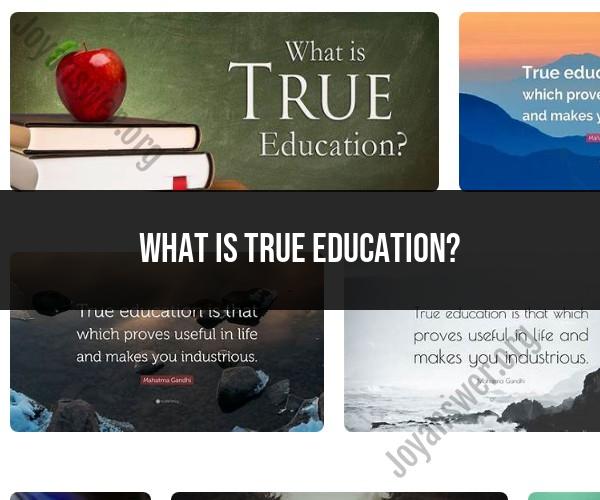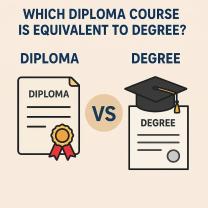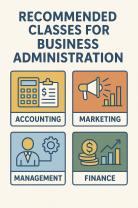What is true education?
"True education" is a concept that goes beyond traditional academic learning and encompasses a broader and more holistic approach to personal development and growth. It emphasizes not only the acquisition of knowledge and skills but also the development of character, values, and a deeper understanding of oneself and the world. While the exact definition of true education may vary among individuals and cultures, it often incorporates the following core principles:
Holistic Development: True education seeks to develop the whole person—mind, body, and spirit. It goes beyond intellectual growth to include emotional, social, and physical well-being.
Critical Thinking: It encourages critical thinking and problem-solving skills, teaching individuals to analyze information, ask questions, and think independently.
Character Building: True education places a strong emphasis on character development, fostering values such as integrity, empathy, honesty, and compassion. It aims to shape individuals into responsible and ethical citizens.
Lifelong Learning: It instills a love for learning that extends beyond formal schooling. True education encourages a lifelong pursuit of knowledge and self-improvement.
Cultural Awareness: It promotes an understanding and appreciation of diverse cultures, perspectives, and beliefs, fostering tolerance and empathy.
Creativity and Innovation: True education encourages creativity and innovation, allowing individuals to express themselves through various forms of art, problem-solving, and original thinking.
Service and Social Responsibility: It instills a sense of social responsibility and the importance of giving back to the community. Service learning and volunteerism are often integral components.
Adaptability: True education equips individuals with the skills and mindset needed to adapt to a rapidly changing world. It emphasizes flexibility and the ability to learn from failures.
Empowerment: It empowers individuals to take control of their own learning and personal growth, fostering self-confidence and independence.
Global Citizenship: In an increasingly interconnected world, true education encourages individuals to become responsible global citizens, addressing global challenges and working toward a more just and sustainable future.
Emotional Intelligence: It emphasizes the development of emotional intelligence, helping individuals understand and manage their emotions while also empathizing with others.
Spiritual and Moral Values: For some, true education incorporates spiritual and moral values, helping individuals find purpose and meaning in life.
Environmental Awareness: Given the environmental challenges of our time, true education often includes an awareness of environmental issues and the importance of sustainability.
It's important to note that true education is not limited to formal educational institutions; it can occur in various settings, including schools, homes, communities, and through self-directed learning. The exact components and emphasis of true education may vary based on cultural, philosophical, and individual beliefs, but the overarching goal is the holistic development of individuals as responsible, compassionate, and lifelong learners who contribute positively to society.
Defining True Education: What It Entails
True education is more than just the acquisition of knowledge. It is a holistic process that involves the development of the mind, body, and spirit. It is about learning how to think critically, solve problems, and make informed decisions. It is also about learning how to live a good and meaningful life.
True education is not limited to the classroom. It can happen anywhere and at any time. It can happen through formal instruction, but it can also happen through informal experiences, such as reading, traveling, and talking to people from different backgrounds.
Here are some of the key elements of true education:
- Critical thinking: True education teaches students how to think critically and question everything. It teaches them how to analyze information and form their own opinions.
- Problem-solving: True education teaches students how to solve problems. It teaches them how to identify problems, brainstorm solutions, and evaluate the results of their solutions.
- Decision-making: True education teaches students how to make informed decisions. It teaches them how to weigh the pros and cons of different options and make the best decision based on their values and goals.
- Character development: True education helps students to develop good character traits, such as honesty, integrity, compassion, and respect. It teaches them how to be good citizens and make a positive contribution to the world.
True Education Unveiled: Understanding Its Essence
True education is about more than just getting good grades or getting a good job. It is about becoming a well-rounded and knowledgeable person. It is about developing the skills and qualities that will allow you to live a fulfilling and meaningful life.
True education is also about becoming a lifelong learner. It is about developing a passion for learning and a desire to constantly improve yourself. It is about being open to new ideas and experiences.
The Quest for Knowledge: Exploring the Concept of True Education
The quest for knowledge is a lifelong journey. True education is about more than just acquiring knowledge; it is about using knowledge to make the world a better place. It is about using knowledge to solve problems, to create new things, and to make a difference in the lives of others.
True education is about more than just being successful in your career; it is about being successful in life. It is about living a life that is true to your values and goals. It is about making a positive contribution to the world.
Here are some tips for pursuing true education:
- Be curious: Ask questions and explore new ideas.
- Be open-minded: Be willing to consider different perspectives.
- Be reflective: Think about what you are learning and how you can apply it to your life.
- Be engaged: Be active in your learning process.
- Be lifelong learners: Continue to learn throughout your life.
True education is a journey, not a destination. It is a lifelong process of learning and growth. It is about becoming a well-rounded and knowledgeable person who can make a positive contribution to the world.













